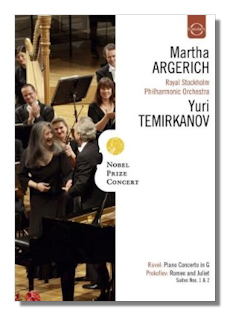
The Internet's Premier Classical Music Source
Related Links
-
Chopin Reviews
Prokofieff Reviews
Ravel Reviews
Shostakovich Reviews - Latest Reviews
- More Reviews
-
By Composer
-
Collections
DVD & Blu-ray
Books
Concert Reviews
Articles/Interviews
Software
Audio
Search Amazon
Recommended Links
Site News
 DVD Review
DVD Review
Nobel Prize Concert

- Serge Prokofieff: Suites 1 & 2 from Roméo & Juliet (excerpts)
- Maurice Ravel: Piano Concerto in G Major *
- Dmitri Shostakovich: Festive Overture
- Frédéric Chopin: Mazurka in C Major, Op. 24, #2
* Martha Argerich, piano
Royal Stockholm Philharmonic Orchestra/Yuri Temirkanov
Live, Stockholm Concert Center, December 8, 2009
EuroArts DVD 2057898 LPCM Stereo Dolby Digital DTS Widescreen Anamorphic
As the reader will notice from the headnote, this is an account of the Nobel Prize concert from 2009. That was the year President Obama was awarded the Nobel Prize for Peace, apparently for actions the committee expected he would take in the future. He was not present at this concert, though Princess Victoria of Sweden and other dignitaries were. No matter, with or without VIPs, the concert was worthwhile. Temirkanov led off the proceedings with a performance of the Shostakovich Festive Overture, a piece he has recorded on DVD before, initially on the EuroArts Gala Concert – 300 Years of St. Petersburg. The work is a light, celebratory piece of about six minutes in length, and the performance here was fully convincing.
Martha Argerich, who by the way gets top billing on the DVD's cover, then came on to perform the Ravel G Major Concerto, a work she has recorded at least twice before, on both occasions for DG, the first time coupled with the Prokofiev 3rd (Abbado conducting), and the second coupled with the Ravel D minor, for left hand, which was performed by Michel Beroff. Argerich knows the G Major Concerto well and always performs it with spirit and commitment. So you won't go wrong with this performance. If you have followed her career, you have noticed that she has played this concerto and the Prokofiev 3rd probably more times than any others. In fact, it appears the Prokofiev is her favorite. Argerich performs the Chopin Mazurka in C, Op. 24 #2, as an encore. Again, her performance is splendid.
Music from Prokofiev's Roméo and Juliet occupies the latter half of the concert. Suite #2 leads off and is played complete, except for #6 – Dance of the Antillean Maidens. Three numbers from Suite #1 follow: #2 – Scene; #5 – Masks; and #7 – Death of Tybalt. I'm not sure why Temirkanov reversed the order of the suites, since it would have made much more sense to close with Roméo at Juliet's Grave (#7 from Suite #2). At any rate, Temirkanov leads the orchestra with a good sense for Prokofiev's ranging moods here, from the dark conflict and struggle in the Mantagues and Capulets to the playfulness of Juliet the Young Girl to the tragedy and passion of Roméo at Juliet's Grave. The sound on all works is excellent and the camera work is fine. Highly recommended.
Copyright © 2010, Robert Cummings.





















